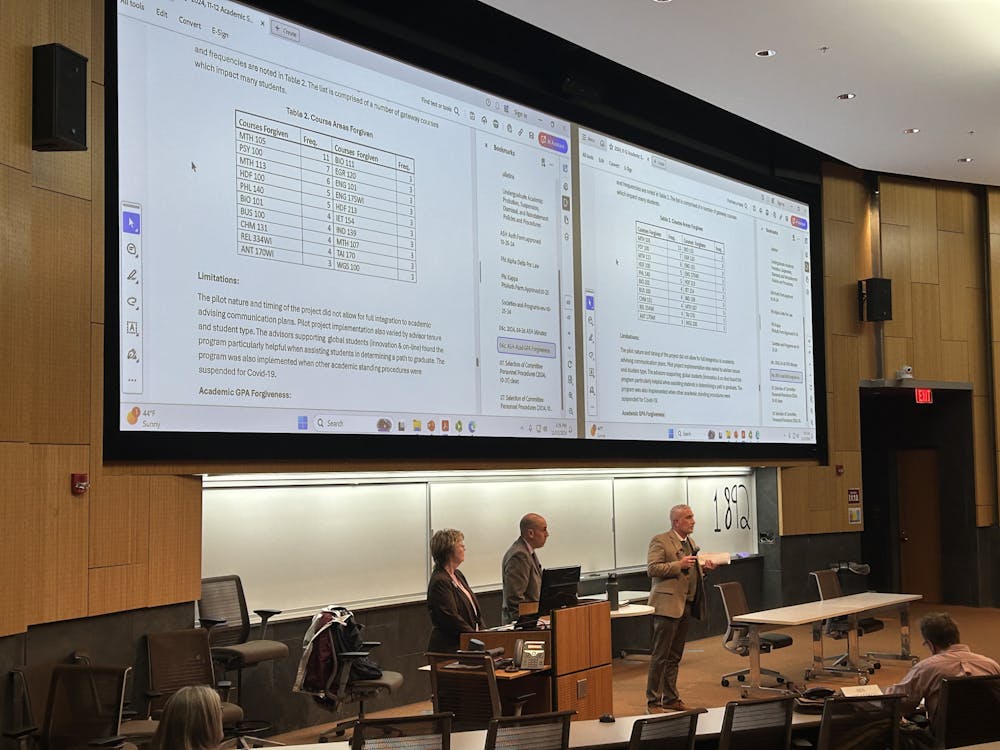Academic Senate meets MacKinnon, considers GPA makeup plan

At President Neil MacKinnon’s first meeting of the Academic Senate on Tuesday, members asked questions of the new executive and considered a change to academic probation rules. They also received an update on the 2024 changes to Title IX.
Senators submitted questions to the president ahead of the meeting. The first asked what he sees as the challenges Central Michigan University is facing.
“My answer might change depending on what I hear from each of you,” MacKinnon said, referring to his upcoming visits to departments and colleges around the University. “(The Board of Trustees) is looking for us to implement the strategic plan … and the second challenge, unsurprisingly, is enrollment."
MacKinnon self-identified as a “nerd” for strategic plans, and said he intends to implement and show progress on the plan in place.
As for enrollment, MacKinnon pointed out that he has increased the enrollment at his past two universities: Augusta University and the University of Cincinnati.
Enrollment reports from Augusta University show an increase of almost 1,000 students from fall 2021 to fall 2023. At the University of Cincinnati, the increase was over 3,000 students from 2014-2020 according to UC News.
“You don’t need me to tell you the recent challenges with enrollment,” he said. “This year we went up just a tiny, tiny bit. But the trend overall is still worrisome.”
Senators also asked about the impacts of the recent presidential election, and what potential changes could affect current students and prospective international students.
MacKinnon said he’s not expecting an impact on the enrollment of international students because of the president-elect. Instead, the recent cap on student visas in Canada, he said, could have prospective international students looking at options elsewhere, like CMU.
As for the impact on current students, the question pointed out feelings of fear among women and members of the LGBTQ+ community on campus. MacKinnon reiterated a message similar to the university-wide email he sent on Nov. 1.
“Voting … is just one small part of our civic life: In fact, what we do after the votes are counted is just as important as the results of the election,” he said. “Now is the time to double down on our values, to support each other… and engage in productive dialogue.”
GPA lifeline?
Evan Montague is the executive director of student success and academic advancement and assistance. He explained a program that would allow students to retake classes and have the new, hopefully higher, grade replace the previous one.
What’s new is that the grade from the student’s first try at a class wouldn’t impact their GPA.
“Academic forgiveness is a retention and student-success focused approach,” Montague said. “What this does is allow a student, once they complete 12 new credit hours, they can have 12 credit hours forgiven.”
He said it does not wave, change or alter any degree requirements, but it does help students keep going in their programs.
After a pilot program at CMU and observing reference programs at other institutions, Montague said “We found a 65.2% continuance rate of participating students.”
The students’ success at their program would be assessed by their academic advisor, something that prompted a Senator to ask about the workload for academic advisors, should this be implemented.
“It’s the right kind of work, and it encourages advisor engagement,” Montague said.
The senators will take the plan back to their respective departments and return to the question of approving the plan at a future Academic Senate meeting.
Updating Title IX
In April of this year, the presidential administration under Joe Biden added regulations to Title IX that public schools and universities around the country have to follow.
According to Mary Martinez, assistant to the president for institutional equity and CMU’s Title IX coordinator, those changes include:
- identifiers for gender identity (rather than sex)
- the treatment of pregnant people and parents
- expanding the definition of sex discrimination
However, there are limitations to applying those regulations. Court rulings around the country have created injunctions (legal pauses on implementation) for schools and universities to change how they adhere to Title IX.
CMU is one of three public universities in Michigan not affected by an injunction. So, Martinez said the university is moving forward with implementing the new regulations.
For employees, she said that looks like a new Title IX training (shorter than the current one) under development and observing the new definition of sex-based discrimination in admissions, employment, education programs and other activities:
- Sex stereotypes
- Sex characteristics
- Pregnancy or related conditions
- Sexual orientation
- Gender identity
Future Academic Senate meetings will occur at 3:30 p.m. every other Tuesday at the Education and Human Services Building in the French Auditorium. Livestreams of the meeting and all future meetings can be found on CMU’s website.






